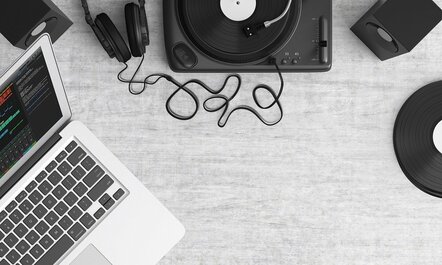New York, NY (Top40 Charts) Having a home studio can be incredibly empowering; it allows you to create and produce music in the comfort of your own space. But if it is not properly set up with the right equipment, then your recordings may suffer from unwanted noise or interference.
To ensure that your home studio is optimized for sound quality and efficiency, here is a list of essential musical equipment every home studio should have.
1. Amps
While amps may not be used as often as other pieces of gear in a home studio, they can still provide some great options for creating unique sounds or effects when playing back instruments through them.
If you plan on using amps in your setup then make sure to research which type of amp is best for your intended purpose; tube pre amps are particularly good at adding warmth and depth to a signal.
2. Audio Interface
An audio interface is an essential piece of hardware if you plan to record any kind of analog audio (vocals, acoustic instruments, etc) into a computer. It essentially acts as an intermediary between the microphone/music source and the computer software/DAW (Digital Audio Workstation).
The audio interface will provide the necessary preamps and converters to ensure that your signal is of the highest quality.
3. Microphone
Some audio interfaces come with a built-in microphone, but in most cases it is best to purchase a separate one. If you are looking to record vocals or acoustic instruments, then you should look for a large diaphragm condenser microphone as they are much more sensitive than other types of microphones.
A good starting point would be the AKG P420 which features three selectable polar patterns for optimal recording flexibility.
4. Headphones
When recording and producing it is important to monitor what is being played back accurately; this means investing in a good pair of studio headphones.
Closed back headphones are ideal for recording purposes as they provide excellent sound isolation and prevent any outside sound interference.
5. Studio Monitors
While headphones can be great for monitoring, you may want to invest in a pair of studio monitors if you plan on creating mixes that will translate well to other systems (speakers, car stereos, etc).
When selecting monitors make sure they are flat frequency response across the entire spectrum so your mix will translate accurately regardless of playback system.
6. MIDI Controller
A MIDI controller is an essential piece of hardware if you plan on controlling virtual instruments or giving physical control over a digital audio workstation (DAW). There are many different types available such as keyboard controllers, drum pads, and wind controllers.
Investing in one will give you greater control over your sound and help to make recording and production much more efficient.
7. Cables
There is no studio setup without cables; they are essential for connecting all of your equipment together. It is important to have a variety of different types of cables on hand such as XLR, 1/4" TRS, RCA, MIDI and other kinds in order to easily connect all the necessary components. Make sure you have spare cables just in case something goes wrong or you need to make any changes.
Investing in quality cabling will ensure that your signal remains clear and noise-free for optimum audio performance.
In Conclusion
Having the right musical equipment in your home studio can make all the difference between a great-sounding recording or mix and one that doesn't quite hit the mark. By following this list of essential music equipment, you should have everything you need to get started in creating professional-level recordings from the comfort of your own space. So don't wait any longer and start building your dream studio today!
























